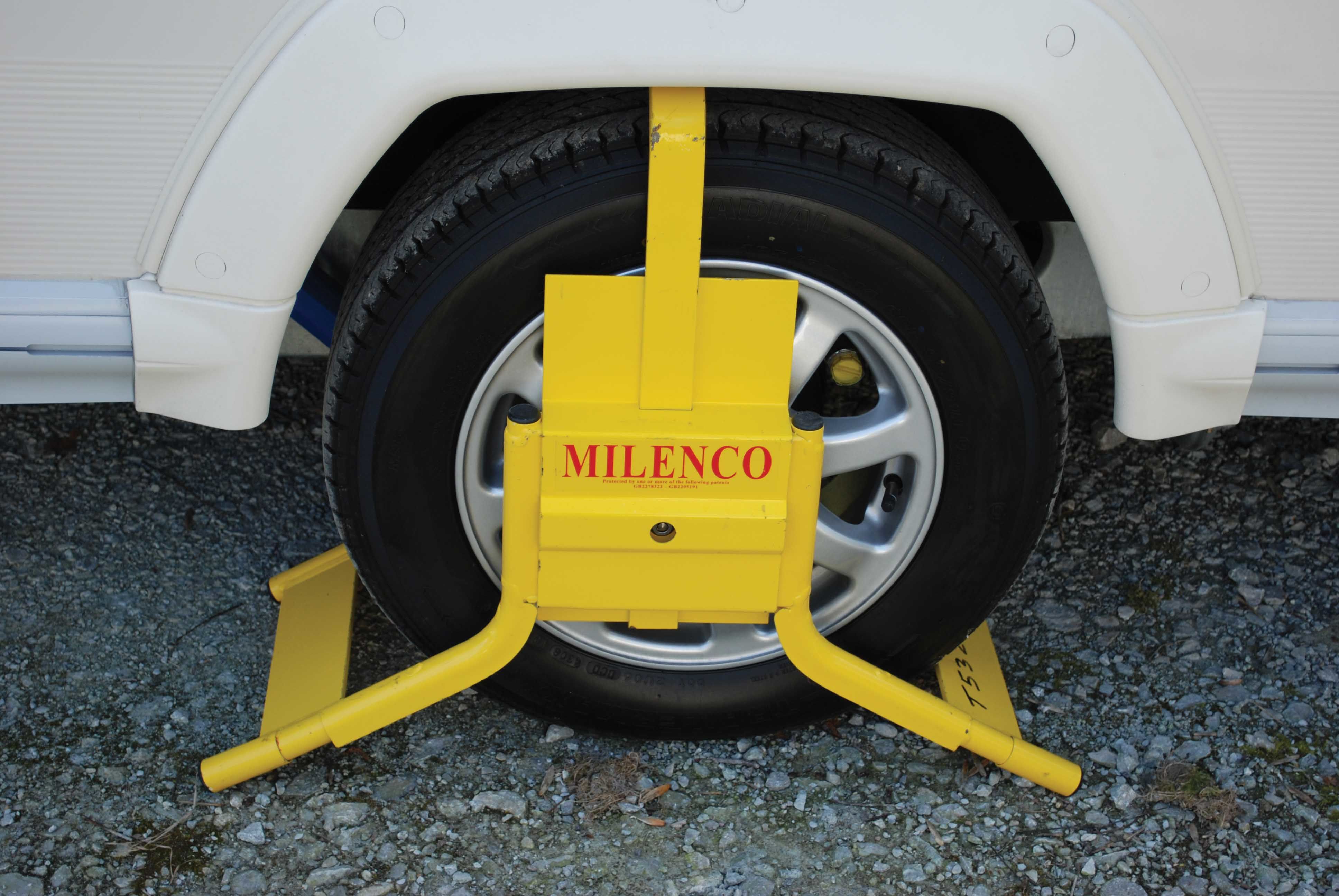
A wheel clamp in use
Most of us accept the need to maintain our caravan or motorhome to obtain the maximum benefit from it but sometimes security is neglected as being unessential, until it's too late. There is always a risk of theft and thieves will see an opportunity whether your caravan, motorhome or trailer is worth 25,000 or 1,000. Much of the following advice is directed at caravans but some is applicable to trailers and motorhomes, with mention of some products applicable to particular units.
Get more free help and advice when you join the Club.
Basic Advice
- Deter the opportunist thief by using relatively inexpensive products
- Consider the best security devices available to reduce the risks of your unit being stolen and also reduce your insurance premiums
- Consider means to help recovery of your unit if it is stolen
- Deter thefts of property from your unit with simple devices
- Thieves don't only steal when your unit is stored, it's vulnerable at all times even when just stopping for a cup of tea or to stretch your legs at a motorway service station. You therefore need to consider a range of measures to protect yourself at all times.
Products to deter the thief
There are hundreds of caravan security devices on the market, with some being better than others. As with most things you generally get what you pay for, but independent testing is often the best way to check the capability of security equipment.
Sold Secure is an independent organisation, carrying out testing on a wide range of security devices, including those for caravans. You may also see Thatcham approved products and those accredited by European bodies such as TUV and SCM. The Sold Secure logo will be seen on many security products sold in the UK with gold, silver and bronze ratings. Wheel locks can obtain a diamond rating.
It is important to understand that no product can guarantee a unit will not be stolen. The aim is to deter a thief who prefers easier pickings or to slow down the more determined thief, or the one with a good toolbox containing large lever bars and disc cutters.
Fitting more than one security measure should slow down a thief more than simply using one. When looking at mechanical security devices remember there are at least two things to consider the strength of the material it is made of and the lock. A wheel clamp made of thick high-grade steel is worthless if secured by a cheap lock that can be defeated in a minute.
You will also need to consider the requirement of your insurance company. Often policies will require a minimum of a hitchlock and wheel clamp to be fitted to a caravan for standard cover, but will give discounts if higher grade measures like an approved wheel lock or tracker device is fitted.
Don't forget to make sure the thief knows the device is fitted so brightly coloured devices or stickers in the window help, though some tracker devices depend on being hidden and unknown to the thief.

A hitchlock on a hitch
Hitch locks
A good hitch lock will provide a reasonable degree of protection from the opportunist thief, but it will not provide sufficient security on its own as the determined thief can bypass the device. Buy one that is manufactured from heavy steel and covers the hitch fixing bolts. Some hitch locks can lock the caravan to the car towball and this is useful when stopping at a service station en route to a campsite. Even if designed to do so we do not recommend leaving the hitch lock fitted while in transit, it may hinder the Emergency Services.
Wheel clamps
Wheel clamps come in all sorts of qualities, but a good product will help deter thieves as it takes time to remove. It should always be used whenever the caravan is left unattended, at home or away.
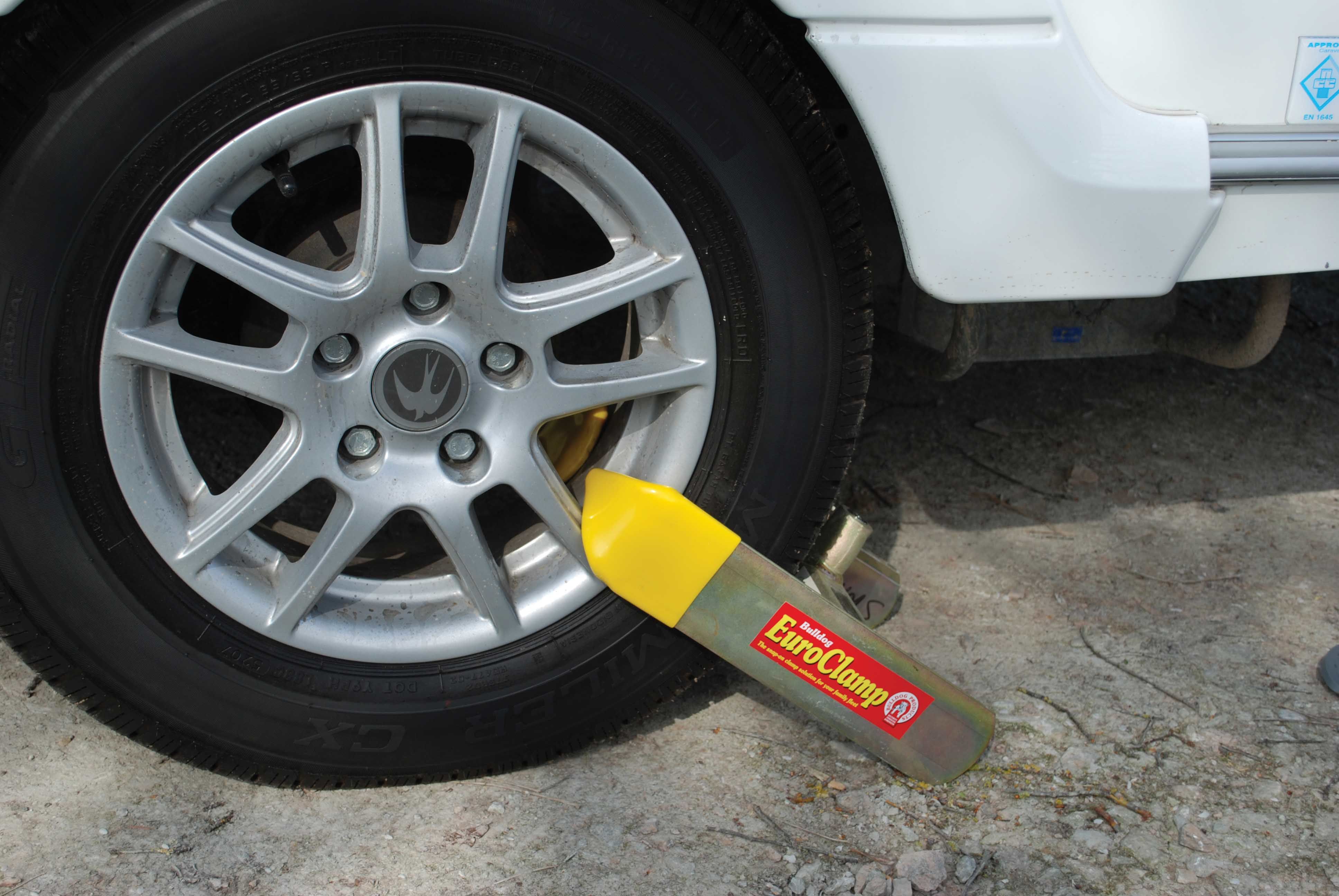
A simple wheel clamp
Remember, if the product is heavy, bulky and difficult to fit, you are less likely to use it and however effective it is, it's useless unless it's fitted. For example, take a couple of Milenco products, both Gold Sold Secure gold rated wheel clamps. The Original wheel clamp is ideal for taking away at a relatively lightweight 12.3kg, while its big brother the Mega Clamp is far heavier at 27.5kg and boasts concrete-filled arms that will resist most forms of attack disc cutters and oxyacetylene burning.
The Mega Clamp should provide better protection and could be a good choice for when the caravan is left in storage but may be too large to take away on holiday. Remember to read the manufacturer's instructions and comply with them. Also, some clamps leave the unit's wheel nuts exposed meaning the clamp can be removed by removing the wheel. In this case, you may like to consider using locking wheel nuts alongside the clamp.
Wheel locks
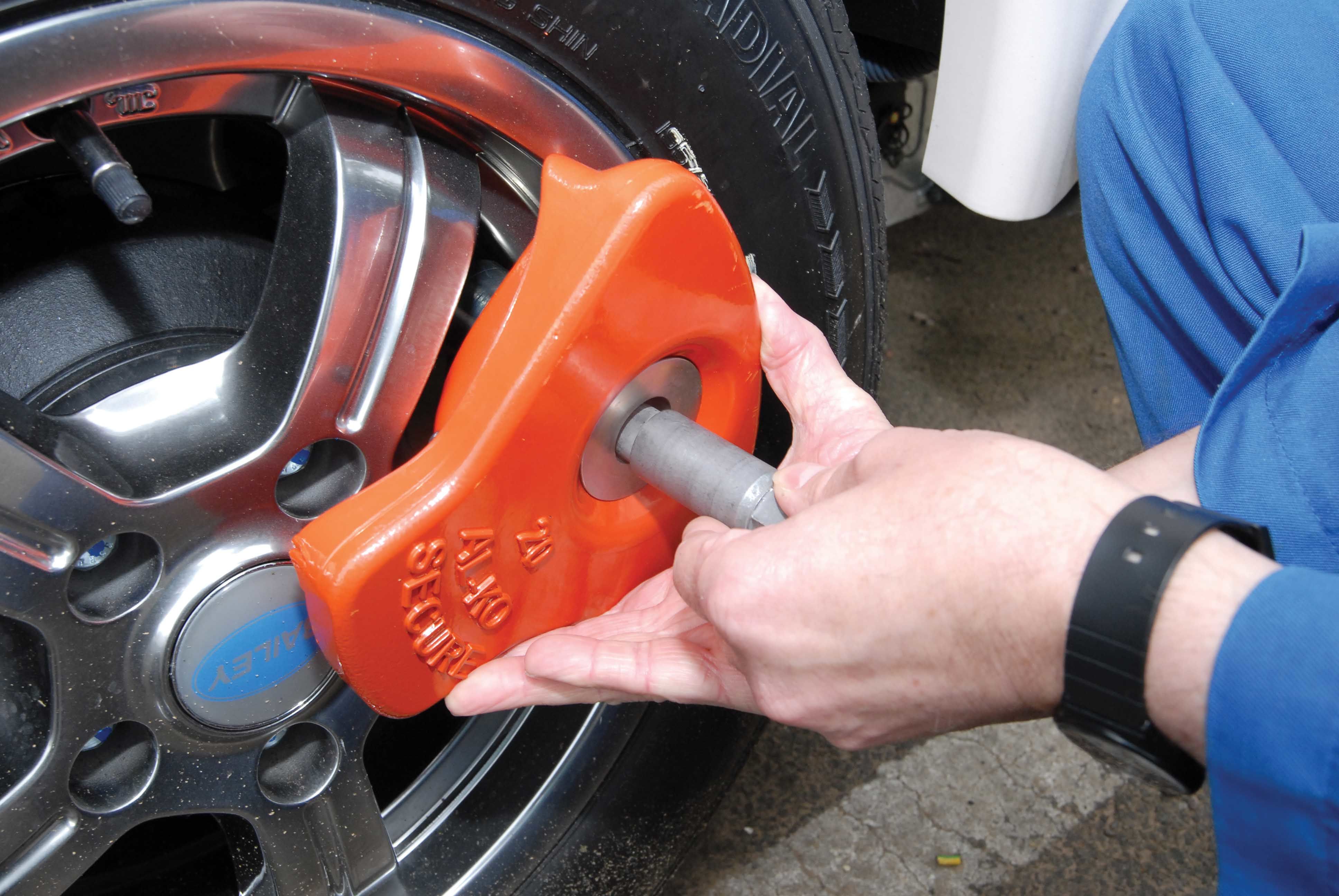
A wheel lock being fitted
Both major caravan chassis manufacturers, AL-KO and BPW, have a security device that fits through the caravan's wheel to an axle-mounted receiver. The devices are made to Sold Secure's Diamond standard, unique to wheel locks, and are recognised as an effective security lock for caravans. Each manufacturer only supplies wheel locks for its own chassis. AL-KO models since about 2001 and BPW models since 2004 can be fitted with this type of wheel lock, but only if your caravan has alloy wheels. The use of these Diamond standard wheel locks will usually produce a significant reduction in your insurance premium. But note the AL-KO wheel locks are specific to the cast of the alloy wheels and a new lock may be needed when you change your caravan.

An aluminium leveller
There is a disadvantage to these locks you have to align the wheel and the receiver perfectly to fit them. This is not usually a problem in storage, but on site when you have achieved your perfect level on the ramp, how do you then align the wheel aperture with hub? One solution is to use a wheel leveller rather than ramp. It can also be challenging to fit the locks to both wheels on a twin-axle caravan. You are likely to need a jack to position the second receiver although a product called LockNLevel may provide a solution.
Security posts
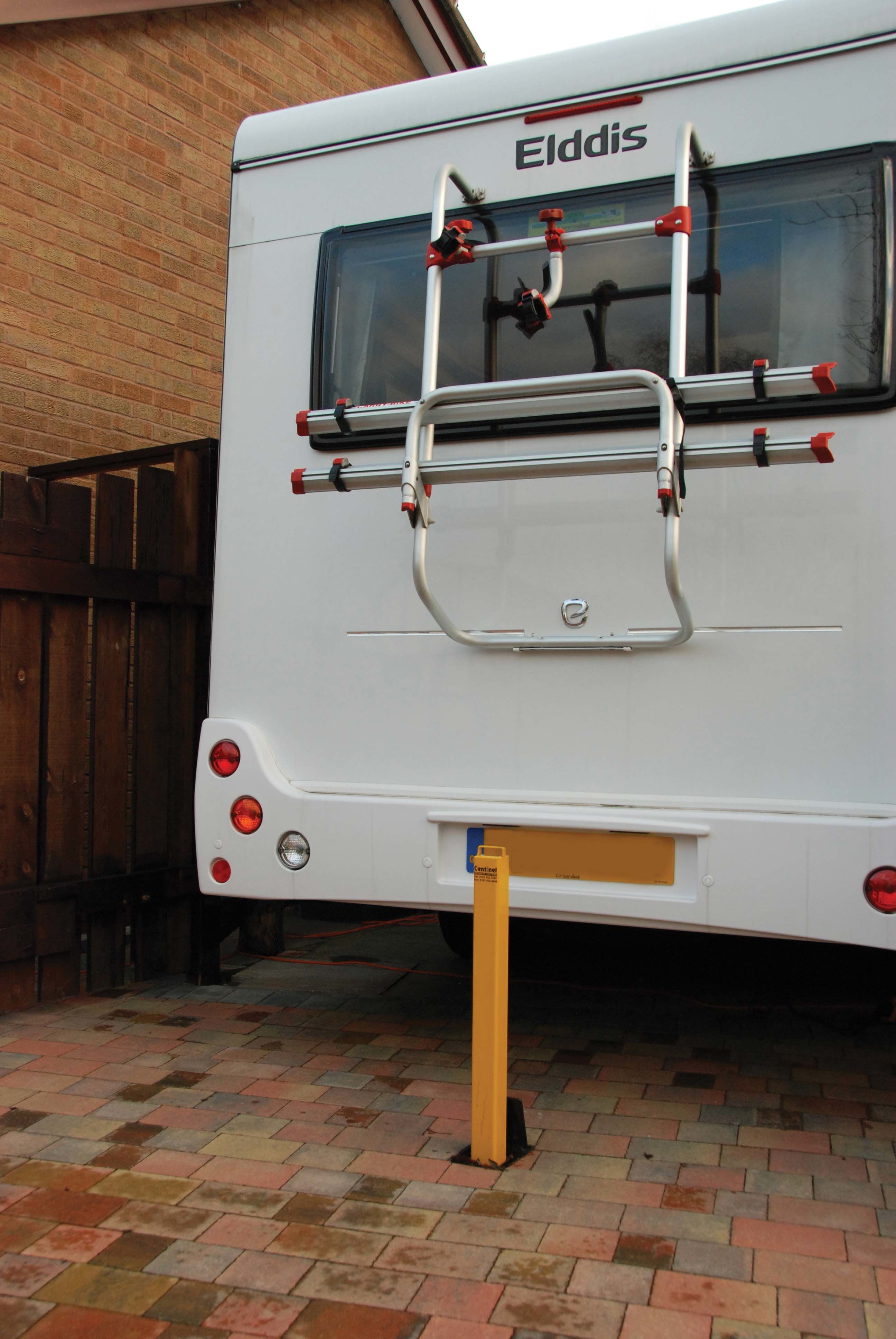
Security post
These can be useful, especially if you keepyour caravan at home. For greatest security the posts need to be set in concrete and have an internal locking mechanism, to avoid the vulnerability of a padlock. Posts can be purchased with a towball on top so the caravan hitch can be locked on making them highly effective as both the hitch lock and post need to be physically overcome to allow the removal of the unit.

A ground anchor
Wheel stands/winter wheels
If you think that taking the wheels off your caravan when it's in storage will provide protection to the tyres and prevent theft think again. Thieves may view the caravan on axle stands as anopportunity for fitting replacement wheels.It could also invalidate your insurance if your provider insists on a wheel clamp or lock being fitted. There are lockable winter wheels available and even a Sold Secure gold standard product, but do check with your insurance company before fitting them.

A corner steady lock
Miscellaneous locks
Corner steady locks are a simple, compact device that enable the corner steady legs to be locked in the down position. These are lightweight, relatively cheap and easy-to-fit devices and can improve an existing good basic security system.

For motorhomes a steering wheel lock or device such as a Clutch Claw are relatively simple mechanical devices, highly visible and a way to deter or slow down a thief. For lightweight trailers and other units a ground anchor is versatile and can be used with chains or special fittings to secure your unit to the ground. There is a portable one for use in soft ground. The secret of ground anchors (as with most other products) is to ensure the whole system is secure a good ground anchor used with a poor chain that can be cut with bolt croppers will be ineffective.
Alarms
A reliable alarm, used alongside other security devices, can deter thieves. It can provide warning if someone attempts to move your caravan or gain entry. Whatever the type and purpose of the alarm, make sure that it is reliable and properly fitted. An alarm that goes off regularly, when no thieves are near, will make youunpopular with neighbours and cause the alarm to be ignored when there is a genuine incident. Consider what features areprovided with the alarm, such as internal motion sensors to detect intruders or other sensors that can detect the rotation of a steady leg winder or movement of the unit. If you keep your caravan at home, it is sometimes possible to connect your caravan system into your home alarm system, if you have one fitted. Similarly, if you have a tracker device fitted it is often possible to link an intruder detector to the same control centre. Talk to the people who fitted your house alarm or tracker unit. One ofthe simplest alarms is the standard personal alarm that uses a pull cord action. These can be used to protect doors at night and can even be used to protect tents, attached between a ground peg and tent zip.
If your unit is stolen the chances of getting it back can be dramatically improved by taking the following measures first:
Taking photographs
Photograph your outfit, taking particular note of any distinctive features that could identify the unit and help the police.
Etching and marking
If your caravan was manufactured in the UK since 1992 it should have a Central Registration & identification Scheme (CRiS) mark on the windows and chassis - a unique 17-character identification. Ensure you keep the CRiS or DVLA registration document for your caravan or motorhome in a safe place and not in your unit. Inside the caravan or motorhome you can use either an ultra-violet pen or a simple spirit-based felt tipped pen on raw plywood inside a cupboard or under beds with the CRiS ID or vehicle registration for a motorhome. If you have an imported caravan you can still have your unit CRiS registered. This is worth doing as the value of the CRiS system is recognised by the police when carrying out checks for stolen caravans. Microdot security packages are also available to mark up an outfit's fixtures and fittings and a system known as Smart Water can be also useful in a caravan's interior to provide a unique, traceable code.
Microchips

CRiS registered caravans from the 1998 model year have a radio frequency identification (RFID) tag fitted as standard within the bodywork. CRiS introduced a new and enhanced identification scheme for the new model year 2016. Called VIN Chip, not only is there an embedded chip, there's tamper evident security labels and the use of scannable QR codes for rapid identity checking by the police. Older caravans can be upgraded, contact CRiS for more information and the bundles available.
Roof marking
Mark the roof of your van with the last six characters of its CRiS number with large stick-on letters that can be read by roadside cameras. Commercial stick-on kits are available or you can make your own.

A good tracking system should bring a quick police response
Tracking systems
The most up-to-date systems use GPS satellite and mobile phone technology to send a signal out that can be used to locate the unit. There are two main types of unit, passive ones and those that automatically send out an alarm when the unit is moved. The better systems will send the signal to a control centre, which will then contact the owner to check the movement is legitimate.
These control centres, if Association of Chief Police Officers (ACPO) approved, will obtain a rapid response from the police. The systems do however require battery power and while the units have their own back-up battery, if the thieves disconnect the unit's battery, this only works for a relatively short period. You must therefore ensure your unit's battery is kept in good condition while in long-term storage. While these systems require a reasonable cash outlay and an annual fee, they produce good results and many insurance companies offer considerable discounts when a good quality tracking system is installed.
- Alarms - Sophisticated alarms to deter theft of the unit are

Extra security measures to safeguard your unit include a Shandleo lock that doubles as a hand hold
often useful to warn of unauthorised entry into the unit. There are also inexpensive small individual alarms available for the doors and windows, although these are generally more suited for short-term use when camping.
- Improved locks - Caravan and motorhome door locks are generally not robust security devices. You can buy kit to improve the security of your existing lock, such as the Brightlock, or your dealer can fit a more secure locking mechanism to your existing lock. Alternatively you can put additional locks on the door. If you fit extra locks, make sure you can still easily exit from the unit in an emergency.
- If you are selling a caravan or motorhome - Never part with your caravan until the money has cleared, this includes building society cheques and bank drafts, which can be forged or stolen.
- If you are buying a caravan or motorhome - Don't buy caravans or motorhomes in
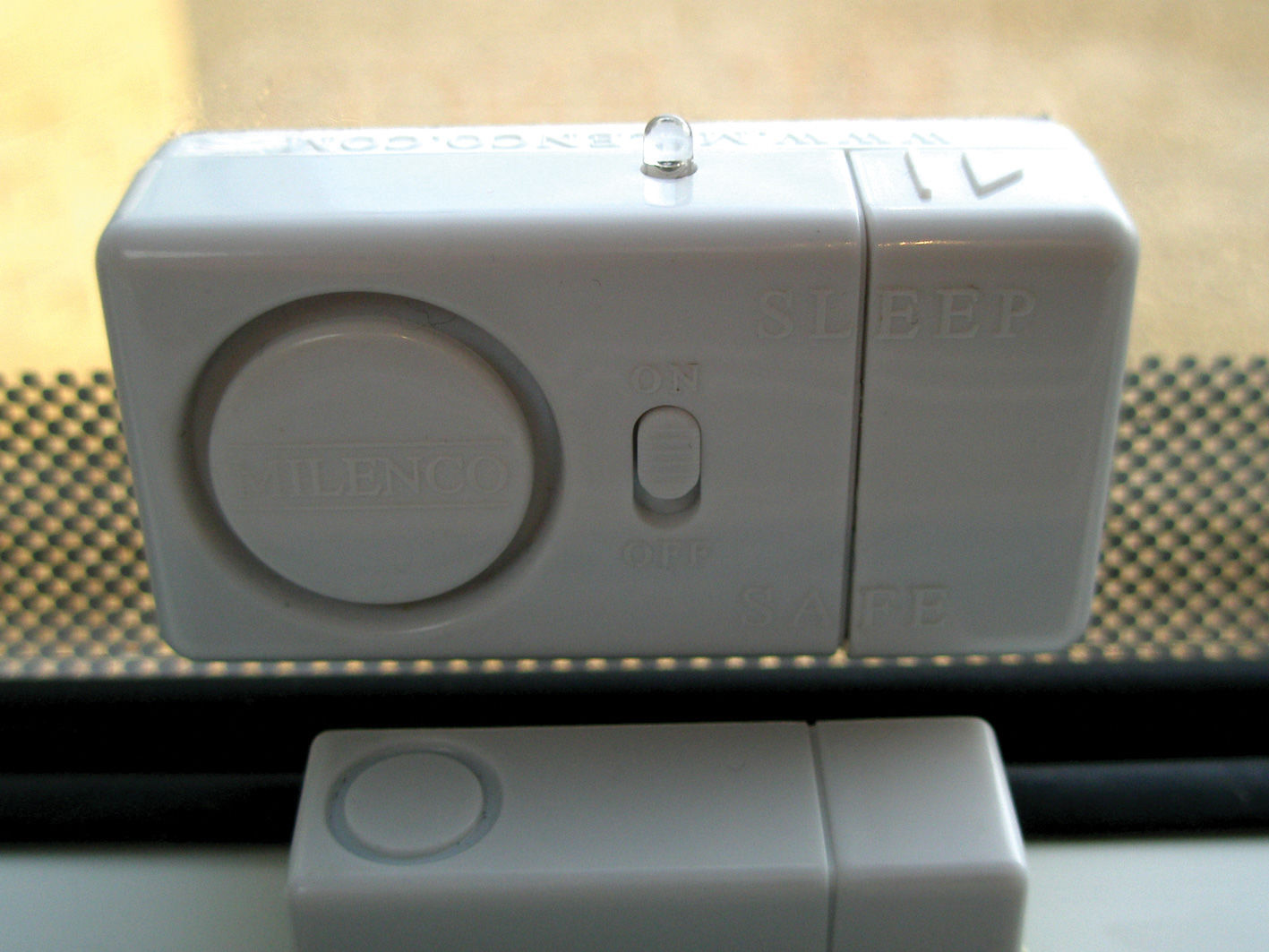
Sleepsafe compact battery window alarm
pub car parks or motorway service stations. Check a seller's ID and remember rogue sellers have been known to use the drive of an empty house. Check the caravan's window CRiS ID. Has it been removed or altered? If it so, contact the police.
- Check if a caravan or motorhome is stolen - Does it have outstanding finance against it or is an insurance write-off by contacting CRiS (caravans) or HPI (motorhomes) using the CRiS ID or registration plate number respectively.
- Be wary of real good deals - When looking to purchase and using the Internet do check the company selling caravans or motorhomes is bonafide. If the price seem too good to be true it probably is so be very cautious. Always pay with a credit card as this should give you additional protection.
If your unit is stolen
- Notify the police and your insurance company. The police will need as full a description as you can give including your unit's chassis number or CRiS number, any other serial numbers and identifying marks or features
- If you have completed the form below, this will be a useful record for the police
- In the case of caravan theft inform CRiS and the Police.

- Security post
- Hitch lock
- Number etched on windows
- High security caravan door lock
- Brightly coloured wheel clamp
- Lock down corner steadies
- Postcode marked on roof
- Items inside marked with postcode
- Reliable alarm system
- Record serial numbers and descriptions of interior fittings

Leisure units are at greatest danger of being stolen when being stored. If you keep your unit at your house you will need to consider many of the preceding products to protect your unit.
An alternative is to use a storage compound. The Club has a number of storage spaces at various Club sites, click here for further details. If this is not convenient, try the Caravan Storage Site Owners Association (CaSSOA), which has members across the country. Some CaSSOA sites have sophisticated security systems and even indoor storage facilities. You will also find storage sites with more basic levels of security as CaSSOA sites are graded according to the level of security - gold, silver or bronze.
When in storage it is worth removing personal items from your unit and leaving the cupboards open so the thief can see there's nothing of value inside. If possible, take out the unit cushions, which will not only keep them dry but dramatically reduce the saleability of the caravan.
And finally...
If you hear or see anything concerning caravan theft or disposal of stolen units contact the confidential free phone Crimestoppers Line on 0800 555111. You may be entitled to a reward and there is no need to give your name if you don't want to.
Please note inclusion on these pages does not constitute endorsement by The Camping and Caravanning Club
If you have feedback on our new format Datasheet, please let us know, using our short Feedback Form.